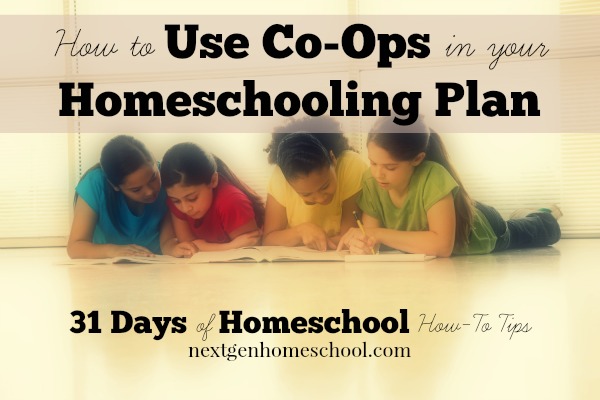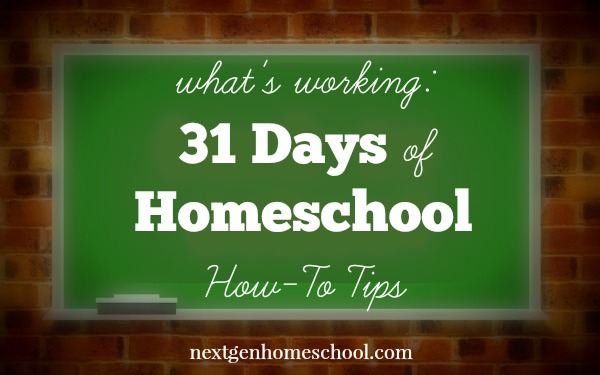Welcome to our October “31 Days” series at NextGen Homeschool: 31 Days of Homeschool How-To Tips! As NextGen Homeschoolers, we remember what it was like to be homeschooled ourselves, and our experiences as students have helped shape many of our best systems and strategies today. In the next 31 days, we’ll be sharing with you what’s working for us, answering the most common questions we get from today’s first-generation homeschooling moms.
How to Use Co-Ops in Your Homeschooling Plan
After attending three different types of homeschool co-ops in the past few years and learning about how several others work, here are my personal opinions regarding incorporating a “co-op” (cooperative schooling) program into your homeschool plan:
1) Decide if you are joining the co-op for social or academic reasons. Ask yourself: Am I joining because I’d like my children to learn how to interact with other kids? Or am I joining because I feel like I could really use some more support in a particular academic area?
If it’s a social reason, be ready to train. There are great Christian moms out there — myself included — who still don’t have their children’s behavior down to a science. Be prepared for many learning experiences alongside your kids in loving, forgiving and saying “no” when necessary.
If it’s an academic reason, just make sure you are aware of the responsibilities and expectations of the group. There be a lot more work than you are ready to take on. Or it might be the push you needed to get some science experiments done!
You might also be looking for homeschool enrichment, a place for your children to expand their education in areas you don’t get to cover at home. Whether it is art, physical education, music, foreign languages or science labs you’re not comfortable teaching yourself, an enrichment co-op can be a great addition to your schedule if it fits your overall academic goals for your children.

2) Establish common goals. A homeschool co-op can be anything from meeting for a park day once a week to meeting twice a week to cover history and Spanish in a group setting. The most important thing is that you and the other moms are on the same page as to what you’d like (or not like) to accomplish. When more moms start to join your group, be prepared for more ideas — which could help or hinder your co-op. Keep your co-op goals in focus.
3) Lay the foundation first. Whether you are starting a co-op or joining an existing co-op, it’s important to know things like, “will this be a Christian co-op or open to all homeschoolers?” Again, you might think this is a given, but it’s not. And there’s no right answer, only the one that works best for you. Do you want to be a part of a mixed group or do you feel spiritual agreement is important to the education of your child? If these questions aren’t addressed from the beginning, they will likely play a role later when subjects are brought to the table on which you have different worldview perspectives, and this can cause division in the group.
4) Smaller is better. Large co-ops are great, as long as you are breaking up into smaller groups at some point — not more than three or four children per adult for most teaching situations. There should be clear parameters as to how many kids and what ages you’d like to join. Not to be exclusive, but to ensure the time is productive and organized — accomplishing what was expected to be accomplished. I think there has to be a really strong leadership group with a vision to pull off seven or more family groups without details falling through the cracks.
One-on-one groups are still my favorite. Find one family whose kids’ ages are in common with yours and take turns covering subjects such as art, art history, science projects, etc., and meet once a week or every other week. The ideas are endless — and it gives your kids something to look forward to during the week.
5) Seasons in your life change. What was a great idea one year may not be the next. Don’t feel bad about changing course: Do what’s right for you and for your kids. One reason we’ve participated in several different co-ops is that our needs have changed and my children are developing new areas of interest. Currently, we’re participating in a weekly one-day co-op that provides great options for both my 8-year-old son and 6-year-old daughter, who have different learning styles and interests that are met through the offerings of our group.
I am the first to say “yes” to everything. I like meeting new people and getting in on what’s good to get in on. But there comes a point that it truly does more damage than good. You are tired by the end of the week, your kids are tired of you yelling at them to get in the car because you’re late once again, and you find your whole goal of homeschooling — to establish good character, consistent rhythms and routines in your home, and reading all those great books — has gone out the window.
I can say that being a part of a co-op has never failed to allow me to be in touch with other great moms. But once you meet some families that work well with yours, joining a co-op simply to hang out with them is not your only answer, though it might be a good start. Impromptu visits to share curriculum and drink coffee once a month or fun picnics will do just as well — and sometimes save your sanity.
You may also consider starting a homeschool co-op of your own to meet the needs of your own family, while including others who have similar goals and ages of children. My sister Renée started a girls book club co-op two years ago that is still going strong today: Here’s her post on how to start a co-op of your own.
Are there homeschool co-op opportunities available near you? If so, do you participate? What type of co-ops do you utilize (formal, informal, social, academic) and why? Have you ever started a co-op of your own? Share your thoughts in the comments below.




